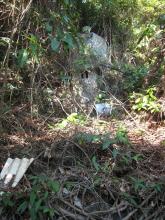15 Jun 1943, John Charter's wartime journal
Primary tabs
The camp is just seething with rumours today: Britain ceased bombing Germany for several days while negotiations for peace were carried on, now the bombing has recommenced on a terrific scale; Italy is out of the war and Turkey is in; we are all going to be repatriated in about one month’s time; Britain has landed troops somewhere in France; the Chinese have won a great victory in central China somewhere; HK was raided by air two days ago.
I believe the heavy bombing of Germany may be correct, but the rest I imagine is pure fiction. It is true that we have been ordered to black out again for almost a week now – so that probably accounts for the raid on HK. This black out is most unpleasant now that the hot weather is upon us. We are not allowed to use our fan because of electricity restrictions, and with night temperatures of 82 to 84 degrees it is simply impossible to hang heavy blankets over the windows, thus excluding what little breeze that does find its way in through the back of the flat. So now we come in at about 8.15 and have supper (bread and jam and water) at about 8.30, by which time the light has almost gone. Then we either sit on the balcony or outside in the vicinity of the blocks and smoke a cigarette until 9.20. At that time a bell rings and we all have to return to our rooms. So it generally means we retire to bed at about 9.30 these days. With the steady deterioration of the food situation these long hours of sleep – or at any rate bed – are probably a good thing. We lie down for two hours at mid-day too, so we spend 12 hours out of 24 lying down!
About June 7th Meijima came into camp and Gimson was called from a BCC meeting to go up the hill to see him. We all expected further news about the repatriation, for though Hatori is No.1 of the Foreign Affairs Section, Meijima is in control of the repatriation and flew recently to Tokyo for instructions. It was he who cabled Hatori that he would have good news for the civilian internees and Hatori passed on the news immediately. Then when Hatori heard further details they were given us in the manner that I reported on 25th May. This time we expected further details, but Gimson drew a complete blank. The notice he posted stated that Mr. Meijima had no further repatriation news; that we were not to be given the ‘tobacco allowance’ that Gimson had applied for (pocket money); that on no account were we to mention the repatriation in post-cards to town, and that he had visited the HK prisoners of war in Japan and that they were all well and happy. We gathered later that the No. 2 was displeased about something. The story went round that Meijima was very annoyed because Hatori had stolen his thunder in the matter of announcing the news to the camp and that he was therefore taking it out of the internees as a result. Whether this is true or not I do not know, though, apparently it does happen quite often amongst these Japanese officers – a matter of losing face I suppose. Meijima came in again yesterday, but so far nothing has been announced about his visit.
I hear that Nakazawa, the No. 2 Superintendant of this camp has been called up for military service and will be leaving here shortly. I think this news is accurate; at all events, Nakazawa presented all members of the softball league with two packets of cigarettes as a memento or, rather, as a parting gift. He was quite a keen softball player and played for the Indian Quarters ‘B’ team.
He is a nice young man of about 25-30 I suppose, and I don’t suppose that his place is likely to be taken by a more congenial person. Today, I hear, he told one of the police, with whom he seems very friendly, that the women are leaving HK at the end of this month and that the men will be leaving a few weeks later. Whether the men are to be taken to Japan or to a British port I do not know; nor do I know how much a person like Nakazawa is really likely to know.
At the end of last month it was announced in the paper that there must be a reduction in the consumption of electricity in HK. The rate charged beyond a certain unit per head in each house increased enormously. Hatori said there must be a 40% reduction in the amount of current used in camp. To effect this, all fans in these flats have been disconnected (there was a fan in the living room of each flat); no cooking by electricity is done by the kitchen; bakeries have doubled up (our bakery now cooks for the hospital and St Stephens bake for block 10 etc). But the principle reduction has been made in the consumption of the flats. Each person is allowed approximatley 14 units per month. This means, in our room, that each person is allowed to use the hot plate for 1 hour per day, these two hotplates being about 2 amps each. This works out quite well, for it means that Y and I between us can cook for 2 hours each day if we want to.

